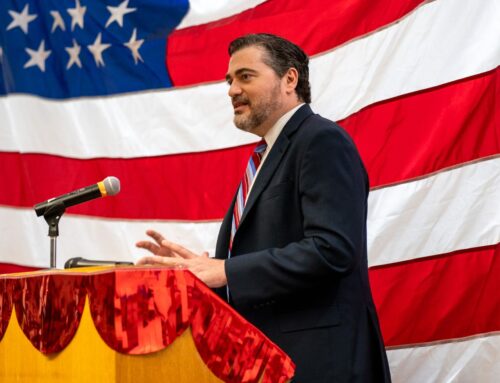The City of Marathon has agreed to construct a deep injection well for treated sewage as part of a settlement offer in a lawsuit filed by the group of Florida Keys residents called Friends of the Lower Keys (FOLKs).
The Federal Clean Water Act lawsuit brought by FOLKs against Marathon to stop its use of shallow sewage wells has now been amicably resolved, FOLKS stated in a news release on Wednesday, Dec. 13. The Marathon City Council, at its meeting Tuesday night, unanimously approved a settlement with FOLKs, agreeing to replace shallow sewage well disposal with a deep well.
“This is a monumental achievement by a group of local volunteers,” Jennifer Rehage, professor of Environmental Studies at Florida International University who studies the impact of the pharmaceuticals in wastewater on local fisheries, stated in the release. “Those local waters are the nurseries for our fisheries, and a deep well is definitely going to help protect them.”
“Once Marathon agreed to the deep well, it was also on-board with other requests from FOLKs which will make the deep well even more protective,” added Caron Balkany, one of FOLKs’ four attorneys in the Clean Water Act litigation. “We applaud the City Council for its unanimous vote. It will be a pleasure to be the city’s ally in environmental stewardship.”
Marathon’s new deep well and the 13 miles of piping needed to connect the existing five wastewater treatment plants will be completed before the end of 2028, according to FOLKs. The five wastewater treatment plants will continue to use advanced wastewater treatment (AWT), even though Florida law permits the use of only secondary treatment for deep well disposal. Marathon agreed to FOLKs’ request to continue that more protective treatment. The deep well will be at least 3,000 feet deep into the boulder zone, FOLKs stated.
Marathon retains the opportunity for reuse of the effluent. If Marathon decides to reuse its AWT effluent for land application such as irrigation or car washing, FOLKs requested that additional salinity treatment (reverse osmosis) be used in order to reduce the impact of runoff on the nearshore waters. Marathon agreed to this as well, although Florida law permits the less-protective secondary treatment for land application, FOLKs stated.
Marathon will provide reports to FOLKs on an ongoing basis as the deep well is being constructed.
In exchange, FOLKs will drop its administrative challenges to Marathon’s pending shallow sewage well permit applications since, after the deep well is completed in 2028, those shallow wells will no longer be used for disposal of sewage effluent. Additionally, FOLKs gave up its right to claim multimillion dollar civil penalties from Marathon under the Clean Water Act, FOLKs stated.
The city will be charged with installation of a deep well at a projected cost of upwards of $50 million by 2028, said Marathon City Manager George Garrett. He advised that Marathon’s Area 6 wastewater treatment area is the proposed site for the deep well.
Area 6 extends from the Vaca Cut Bridge to Coco Plum Drive, and south to the end of Coco Plum Drive.
There is already a wastewater treatment plant there, situated on Avenue I, which would not need replacing, said Garrett. Instead, at the completion of this project, all the city’s effluents from its current plants would flow to this plant before being pumped down into the new deep well.
While many in attendance at Tuesday’s City Council meeting applauded the city’s decision, there were a handful of critical citizen comments about having an industrial capacity plant in a residential neighborhood, a plant Garrett confirmed is already there.
The FOLKs lawsuit against Marathon had been pending resolution while Marathon conducted a feasibility study to explore and potentially choose alternatives to its shallow injection wells. Council members reviewed all the options before the city at an executive session last month. Councilman Jeff Smith confirmed the council collectively believed settling the lawsuit was the best option.
Garrett summarized the city’s decision at the council meeting. He stated, “we took the council’s direction and settled” the lawsuit, believing it was in the city’s best interests.
How the small community of Marathon will fund the project is to be determined. There was some discussion at the meeting about grant funding, but there was nothing specific regarding the potential impact on taxpayers. Smith said the city will arrive at a financial impact statement at some point soon, but believes between bond money and grants, he’s hopeful the effect on taxpayers will be minimal.
Garrett was asked about the contention that the city would be required to install a second deep well for redundancy. He said the city can likely use the current shallow well at Area 6, which will be adjacent to the proposed deep well for that purpose.
Florida law stipulates that daily wastewater volume exceeding 1 million gallons requires a deep well. Garrett has maintained all along that none of Marathon’s wells exceed 900,000 gallons daily, despite exponential growth in the Middle Keys over the past decade.
A recent Penn State University report concluded that “shallow wastewater injection at Area 3 is releasing nutrients and other contaminants to surface waters of the halo zone of the Florida Keys” and that the impact on the halo zone surface waters is in excess of EPA total phosphorus strategic targets, FOLKs stated in its release.
“The Penn State data confirm my earlier predictions that Marathon’s shallow well wastewater effluent is migrating to and impacting the nearshore surface waters,” Big Pine Key resident Donald Maynard stated in the FOLKs release. Maynard is a licensed Florida professional geologist with more than 30 years experience evaluating subsurface contaminant fate and transport. He has been evaluating the hydrogeology of Marathon with FOLKs for the past four years.
FOLKs sued the Florida Keys Aqueduct Authority in 2014 when it and the Monroe County government wanted to use shallow sewage wells at Cudjoe Regional Wastewater Treatment Plant, Balkany said.
“We settled that case, so Cudjoe now has a deep well instead,” Balkany said. “We have great working relationships with FKAA, which just agreed to our request to hook up Bay Point Wastewater Treatment Plant to the Cudjoe deep well, instead of continuing with its shallow wells with only secondary treatment. FKAA takes environmental stewardship seriously.”




